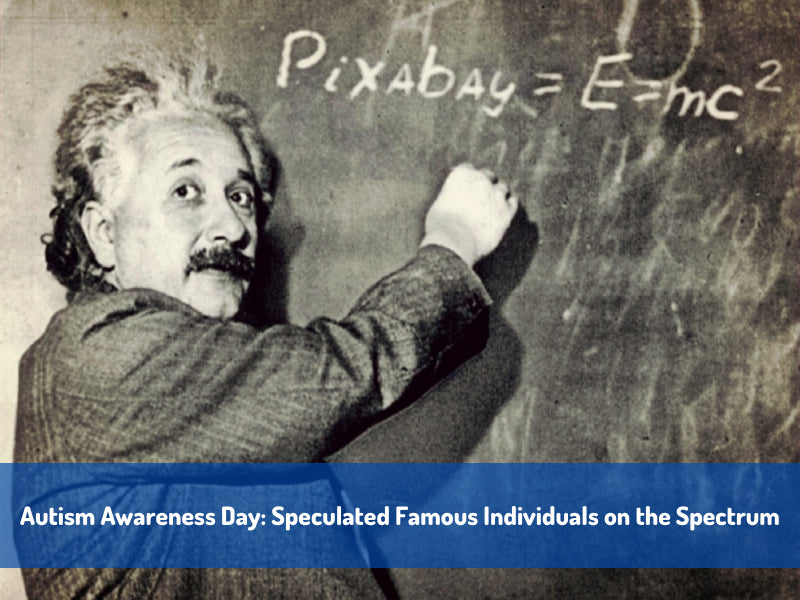Your Cart is Empty
FREE SHIPPING OVER $45 & RETURNLESS REFUNDS

Autism Spectrum Disorder, also known as ASD, is a broad range of conditions characterized by challenges with repetitive behaviors, speech/nonverbal communication, and social skills. Most individuals with Autism have different ways of learning, paying attention, reacting, and understanding things. When some people learn that someone has Autism, they tend to look at it negatively. Except, what some may not know is that any famous, intelligent, people of our past have been speculated to have ASD. They made enough impact on the world to be known by each and every person, just like many with ASD will do in the future.
The average IQ is 100. It was believed that Einstein had an IQ somewhere between 160 to 190. Far above the average. Even though most of Albert’s written childhood is a myth or legend rather than facts, it is well known that Einstein did not start speaking until he was three or four. Up until age 7, he’d only whisper words to himself before he could say them out loud. This also led to him repeating sentences obsessively.
He socially showed no interest in playing games or joining other kids with the activities they were doing. He preferred solidarity where he could read books, do puzzles, work on math problems, and play the violin. Even though his work in school courses was average, he always excelled in what interested him the most- math and science.
He also wasn’t scared to be him quirky, eccentric self.
Henry Cavendish was a natural philosopher, chemist, and a physicist. He is most famously known as the person who discovered hydrogen. Unless it was a necessary meeting at the prestigious Royal Society Club, Henry tried his best to avoid anything regarding social interaction.
When it came to communicating with his servants he did it in writing. If he needed to order his meal, he made sure to leave a note on the table. There was even an added private staircase at the back of his house so he could avoid his housekeeper. People used to describe him as “cold” and “indifferent” just because he refused to make eye contact.
Autism has a huge influence on literary writing. It has been said that Dickinson showed plenty of signs of being autistic. There were poems she wrote that were unconventional for her time period. She only seemed to get along with children. There was also a fascination with scented flowers. Medical professionals have also pointed out that if you have autism there is a much higher chance of having epilepsy which Emily Dickinson had.
Michelangelo’s singular interest was his work. His undivided attention was put into each masterpiece he created. He was described as “erratic” by his family. As a young child and man, he did not get along with his family and also suffered physical abuse. Michelangelo’s mentor has once said that he was unable to make friends or maintain relationships with anyone.
There were even times that he slept in his clothes and boots. This could have just been from sensitivity to anything other than those specific clothes or for the simple fact that it was a routine that he wanted to keep up with. He needed control of his life- family, work, money, and time. Loss of this control would leave him flustered and frustrated.
McClintock was in high school when she discovered her passion for science. Back then, her mother argued with her saying that pursuing her dream to go to college would make her unmarriageable, but her father had allowed her to follow her passion. She devoted her life to the study genetics and came up with groundbreaking work. In 1983 she was the only woman to date who has been awarded the Nobel Prize.
As a child she was independent and was known as being solitary. She saw this as a strength rather than a weakness and referred to her independence as her “capacity to be alone.”
Being on the Autism spectrum doesn’t define you. Even though the above did not have a medical professional’s diagnosis doesn’t mean that they still didn’t face the challenges that one on the spectrum may face daily. Whether you are high-functioning or low-functioning, you can do big things just like the men and women of our past. YOU can lead the future.